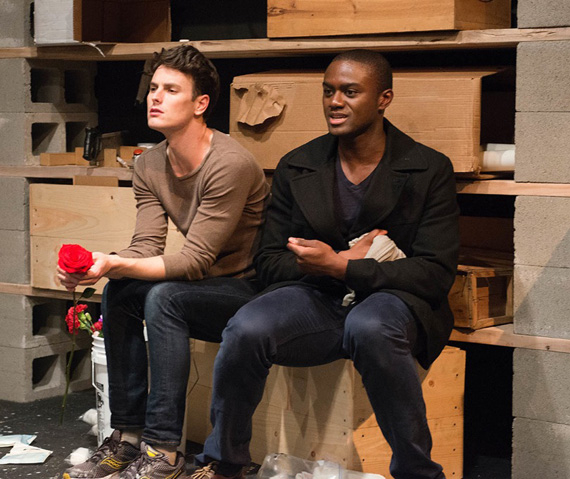Pirira
J. Stephen Brantley takes the audience from Manhattan to Malawi (via Queens) in this smart and insightful world premiere play.

(© Joel Weber)
What does a black Malawian evangelical Christian have in common with a twinky white American gay boy? Very strong feelings about Madonna, it turns out. That’s not all they have in common, however, in J. Stephen Brantley’s emotionally sensitive and sharply intelligent new play, Pirira, which is receiving its world premiere in a production by Theatre 167 at the Chain Theatre.
Brantley uses an old sitcom premise: unlikely (and unfriendly) companions locked in a room. Over the course of their imprisonment, these seemingly irreconcilable people find a new appreciation for one another and their common humanity. In the case of Pirira, it’s NGO workers Ericka (Flor De Liz Perez) and Jack (Brantley). They’re trapped in the supply closet of their small Lilongwe office after Malawian police chase them during the political unrest of July 2011. He’s a Nicholas Cage know-it-all type, familiar with the culture and customs of Malawi and hardened by years of his Sisyphean mission there (he lays pipes for fresh drinking water; locals dig them up and sell the metal; he lays more pipe). She’s a fresh-off-the-plane former financier who clawed her way out of the Marcy projects only to discover that Wall Street is infested with bigger rats and harsher gangsters. That’s why she’s in Malawi.
At the same time, thousands of miles away, Malawian immigrant Gilbert (Adrian Baidoo) and his gay-as-Christmas coworker Chad (Todd Flaherty) toil away at a wholesale flower shop on Manhattan’s 28th Street. They’re trapped by the economic necessity to work more than any physical impediment. Chad says a lot of cringe-inducing things to Gilbert like, “There’s a lot of people with AIDS in your country,” and, “Do you have a big penis?” Gilbert’s responses are often equally cringe-worthy, like his insistence that men do not wear condoms in Malawi because they are real men, unable to control their animal instincts. There’s also his insistence that gays like Chad will burn in eternal hellfire. Can these two men share a flower-shop storeroom without driving each other crazy?
Director Ari Laura Kreith has staged these two scenes, set on different continents, in the intimate confines of the Chain Theatre, a black box that is configured for this show as a traverse stage. With just two rows of seats and the actors mere feet from the audience, we are flies on the wall during these confidential sessions. Set designer Brendan Flaherty seamlessly synthesizes the two settings, giving the actors and Kreith freedom to use the entire space and blurring the lines between the two stories. What seems like two secret pas de deux is actually a complicated pas de quatre.
The scenes overlap, with the characters passing right by one another in the same physical space, even as the script has them oceans apart. This is theater in windows, designed for people accustomed to browsing the Internet with multiple tabs open. It’s a style that Kreith has previously employed to great affect in Jackson Heights 3AM and it works just as well here. The scenes are crystal clear and maintain an independent integrity even as they illuminate and comment on one another, creating a vast tapestry of the human experience.
Baidoo portrays Gilbert with an eerie authenticity and an unwavering Malawian accent (as affirmed by the wife of a former Malawian ambassador sitting next to me at the performance). Flaherty accentuates Chad’s humor-as-a-defense-mechanism tactics in a way that is simultaneously hilarious and uncomfortable. Perez and Brantley have a natural chemistry and conversational style that puts dramatic stakes behind prose that could easily devolve into a laundry list of statistics and facts for hand-wringing socially conscious liberals.
Brantley and Kreith clearly care a lot about the wider world and the people living in it. Theatre 167 (named for the number of languages spoken in the borough of Queens) has a history of presenting their stories with unflinching honesty. Pirira is no exception. With this well-constructed meditation on our differences and similarities (we have a lot more of the latter), Brantley distills our globalized world and shows why it is vital we come to a clearer understanding of one another.









